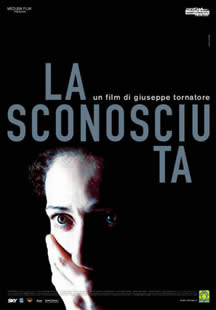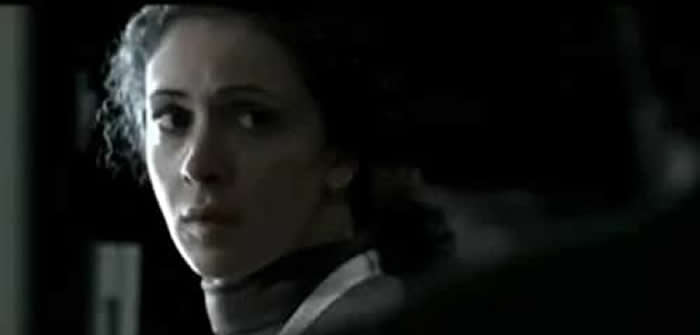Anyone who thinks the hugely popular and sentimental Cinema Paradiso is typical of Giuseppe Tornatore’s cinematic style – or at least typical of the way we’d like him to shoot movies — only has to watch the first few minutes of his most recent feature, The Unknown Woman (La Sconosciuta), to realize that one of Italy’s best-known directors has become something of an unknown man.
Here, Tornatore has gone way beyond the populist realm of Paradiso’s first-blush love, darling naughty boys and the all-embracing soft heart of the Sicilian piazza to embrace instead the cold, horrifying heart of the sex slave trade and the brutal havoc it wreaks on ordinary lives. Especially the life of the mysterious Irena, a refugee from Eastern Europe who, while cleaning houses in Turin, infects herself into the family life of one of her clients, and slyly gains power over them and their young daughter.
But soon Irena finds herself hunted and haunted by the same vicious sex trafficker who kidnapped and raped her in the East. Revealed in ghoulish flashbacks, this plot-point spawns hew horrors and brutalities in Irena’s life and, ultimately, a lot of head-scratching – at least a lot from me — as the film takes on the look and feel of a straight-to-video exploitation film to help explain the “Unknown” of its title.
plot-point spawns hew horrors and brutalities in Irena’s life and, ultimately, a lot of head-scratching – at least a lot from me — as the film takes on the look and feel of a straight-to-video exploitation film to help explain the “Unknown” of its title.
I watched the whole thing in amazement at how the creator of one my favorite films had suddenly gone “Psycho” on me; indeed, parts of the score by Paradiso’s Ennio Morricone sound a lot like Bernard Herrmann. Mystery woman? Some backstories, I hasten to note, may be better served if they’re explained a little less.
The real revelation of the film is its lead actress, Xenia Rappoport, herself an unknown woman to most audiences who don’t hail from Leningrad, where she’s acted in theatre. It’s an understated, dead-honest performance that alone merits the movie’s rise to the final rounds of best foreign language film Oscar race. Somehow, the actress seems to leach out all the toxins of Irena’s horrid past through her eyes alone. This is a talent and a name to remember.
As for Tornatore, there may be hope for his populist penchants to surface again. He recently returned to his native Sicily and to Tunisia to film Baria, about a Sicilian family in the 1930s and named for the Sicilian town where he was born 51 years ago. In 2006 he completed a short film for the upcoming Beijing Olympics, part of a series of directors’ shorts under the aegis of Ang Lee. And then there’s his long-in-the-works and still delayed epic about the siege of Leningrad, originally set to star Nicole Kidman.
For that one, he’s in search of more financing. For this one, The Unknown Woman, I was searching for what drew Tornatore to the story, and what lessons
he learned from the making of it. We sat down recently to talk during one of the directors’ rare visits to L.A. (Quite generously he agreed to attempt English, sparing both of us my forays into Italian.)
James Ulmer: Tell me about The Unknown Woman – I know it was released over a year ago in Italy and got very strong reviews there. It’s a very crazy-quilt mixture of genres, moving in some ways from violent horror and mystery to very intimate melodrama. What was the trigger for the story?
Giuseppe Tornatore: The genesis of the movie is very unusual and very strange, and long. I worked on the idea off and on for 20 years, without the urgency to make the movie. Back in 1986 I read a little article about an Italian woman who was arrested because she put her two children up for sale. That’s all. No information about the character or the story. It  was extraordinary for me, this idea of a mother trying to sell her children. So I started to ask myself, what happens one fine day if this woman decides to take her children back? That’s one of the games an inventor of stories does every day. So step by step the story developed.
was extraordinary for me, this idea of a mother trying to sell her children. So I started to ask myself, what happens one fine day if this woman decides to take her children back? That’s one of the games an inventor of stories does every day. So step by step the story developed.
Then, two years ago when I started to write a draft, I thought that perhaps now, almost 20 years later, the story of a normal woman selling her children was not realistic. Because now in Italy and all over the world, the market for children is a big criminal business. Usually the girls connected to this terrible market are from Eastern Europe. So my woman, the main character, is from an Eastern country.
JU: But the way you told the story — I felt like I was watching a movie by somebody I thought I knew but didn’t know at all. It’s not at all what you’d expect from a Tornatore film. There was the style of exploitation films in the flashbacks with all the harsh music and violence, countered with all the soft music for Irena’s world of the present. How did you approach these two violently different worlds? Have we seen any intimations of this kind of style-hopping in your work before?
GT: This is not the first time that I’ve changed totally my style. When I made A Pure Formality, everybody told me that it is a movie not in the Tornatore style. And when I made my first movie, Cinema Paradiso – well, was that my real style, my identification? I don’t know, because I like to change my styles.
when I made my first movie, Cinema Paradiso – well, was that my real style, my identification? I don’t know, because I like to change my styles.
For example, the question of the violence. In my movie, if you cut all the scenes of violence and you put it all together, it’s not more than three minutes in the whole movie. The movie appears so violent because the violence is not shown. The audience is forced to imagine what they don’t see. And the imagination of the audience is more violent than anything I can possibly show the audience myself.
JU: Tell me a little about your discovery of Xenia Rappoport. I think she’s going to be a major star.
GT: I agree with you. Maybe the most difficult thing in this project was the search for the actress. All the other things were so easy and simple but the actress was so important. I made many, many casting (calls) in different countries. In the end I selected nine actresses from Ukraine, Russia, Moldavia, Romania, et cetera. These nine actresses in Rome made some key screen tests. After shooting the screen tests immediately I knew that Xenia was the right actress for my movie. Even her name was very magical, because the name Xenia in Greek means “unknown” or “foreign.”
JU: What was it that surprised you most about yourself in making this movie?
GT: I was happy because I had the possibility to change totally. It was like I was making my first movie all over again, with the same fear, with the same tensions. To change your style, to change your story, to change everything – it was like coming back to the first movie I ever made, and that felt great.
For information on screening schedule of Unknown Woman at Santa Barbara International Film Festival, please check: http://www.sbfilmfestival.org/

